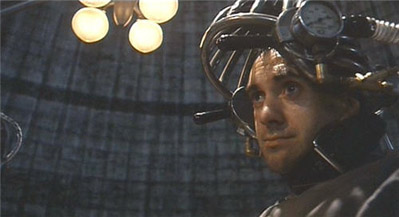Viking Night: Brazil
By Bruce Hall
May 5, 2010
Beloved by many and befuddling to many more, Terry Gilliam has been making films both beloved and befuddling for a very long time. Perhaps the most significant and notorious maverick filmmaker of the past 30 years, Gilliam is a polarizing figure within the Hollywood system; although his material itself often invites critical controversy due to its unusual content. Much like Stanley Kubrick before him, Gilliam’s uncompromising creative vision and obsessive attention to detail have forced him to work largely outside the Hollywood mainstream. This has the benefit of far greater artistic flexibility, but it often leads to even greater creative challenges. As a result, most of Gilliam’s catalogue comes across as philosophically dense and experimental. His most personal films are akin to "novels made of images" - through which one can often gain more insight into the storyteller than the story.
While this is fascinating from an aesthetic standpoint, it renders many of Gilliam’s efforts somewhat inaccessible to mainstream audiences, leaving those already comfortable with him most able to appreciate him. That’s a bit of a shame because on the one hand, I’ve always felt that an overabundance of creative fanaticism is often the best way to bore more people than you entertain. But on the other hand, behind the zeal of a determined storyteller, this approach also ensures that for better or worse, nobody’s ideas are going to be on screen but yours.
This is definitely the case with Brazil, Gilliam’s ambitious 1985 film which is widely regarded as among his most significant works. Equal parts exhilarating, exasperating, macabre and moving, it is textbook Gilliam; the second part of what he called his "Trilogy of Imagination." Brazil is book-ended by Time Bandits and The Adventures of Baron Munchausen, and all three films sought to explore the escapist properties of imagination through the eyes of three very different characters in three very different universes.
Brazil centers on the efforts of a disillusioned idealist in an imaginary totalitarian state who struggles to find meaning in the drudgery of every day life, only to eventually become the victim of his own naiveté. In Brazil, trademark juxtapositions of reality and surrealism; modernism and antiquity abound, endowing the film with Gilliam’s distinctive dreamlike flair. Add to this the filmmaker’s well known disdain for bureaucracy and organized authority and you have what might have happened if Hunter S. Thompson went to bed dreaming about Max Weber – and Terry Gilliam was there to film it. But at the end of the day, Brazil is less a political satire and more of a dark, meditative comedy. It is George Orwell’s worst dystopian nightmare served up on a silver platter of cheeky irony, garnished with a healthy dose of winking sarcasm.
Sam Lowry (Jonathan Pryce) is a government technician in a dreary, retro futuristic version of England where a mildly oppressive totalitarian regime controls every aspect of daily life. I say "mildly" oppressive because the government doesn’t seem overtly militaristic, although they are by no means above using force. They just seem to be the result of a once well meaning bureaucracy run amok, less able to effectively police its own actions than it is those of its citizens. Basic services such as plumbing, sanitation and power are in constant disarray, but the government remains organized enough to keep a watchful eye on the people.
Continued:
1
2
3
|
|
|
|




